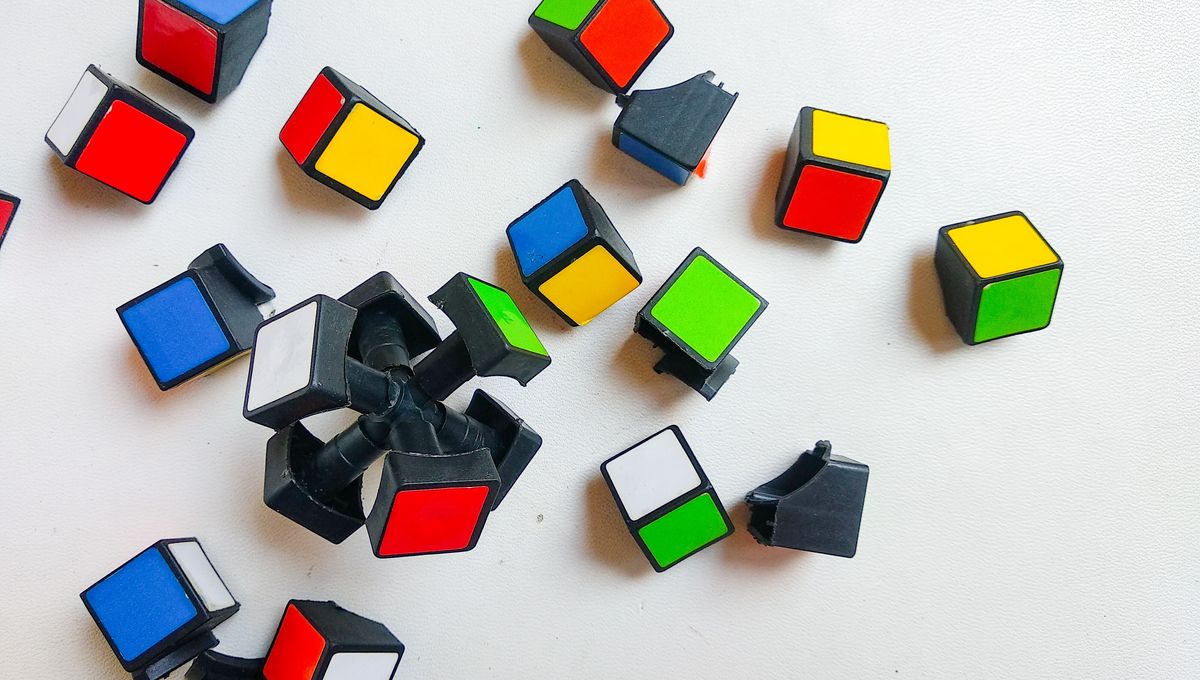
There’s a common trope in movies and TV where, to show a character is off-the-charts smart, the writers will have them solve a Rubik’s cube. The idea, obviously, is that said Platonic solid is so complex, so utterly bamboozling, that only those with a genius-level intellect would be able to wrangle it successfully.
Well, it seems that for some people – and by “some people”, we mean “a bunch of physicists and mathematicians from the University of Colorado Boulder who wanted to win a bet” – this classical version of the puzzle is just too simple to bother with. You know what’s better? Quantum Rubik’s cube.
“To make a quantum puzzle, we will replace the pieces with quantum particles,” explain the authors of a recent paper, not yet peer-reviewed, exploring the possibilities of an atomic-scale pastime.
“A single species of identical particles will replace all the blue pieces and so on for all the other colors,” they write. “All particles of the same ‘color’ will be indistinguishable from one another, but all particles of different colors will be distinguishable. As the pieces are permuted, we must correctly account for the exchange statistics of the identical particles.”
So, now we have the cube itself – although it should more properly be called a cuboid, since it’s two particles tall and wide but only one particle deep – how does a puzzler interact with it?
Well, for the most part, it’s exactly how you’d expect. The team reduced the number of obvious possible moves down to just two: a rotation in the z-axis, and a rotation in the x-axis – any other move can be built up by various combinations of these. At this point, all we have is a particularly easy classical Rubik’s cube: “Any scramble of this puzzle can be solved in at most three moves,” the team notes.
But here’s where things get interesting. There’s one more move that can be performed on this version of the game – and it’s only possible because of the quantum setting. It is, the team writes, “the square root of a permutation,” and what that means in practice is the following: with a quantum Rubik’s cube, the sides can be both moved and not-moved at the same time.
So, what does that mean for the game? Well, put it this way: in a normal Rubik’s cube – the kind with six faces of nine squares each – there are a possible 43 quintillion ways to set the puzzle up. Nevertheless, many people can solve them in a matter of seconds – the world record (by a human, at least) is actually just 3.13 seconds.
With the quantum version, however, that time is – well, it’s longer. “If I give you a scrambled puzzle, it could take you arbitrarily many moves to solve,” Noah Lordi, a physics PhD student and one of the authors of the paper, told New Scientist. “I could give you a scramble that takes 20 million moves to solve.”
That’s right: with a quantum Rubik’s cube, there are an infinite number of possible states – a property that the paper notes makes it “unlike common permutation puzzles from toy stores.” But does that mean the puzzle is completely unsolvable?
Not quite. There are two ways out of this tangle, and both are pleasingly baffling: first, you could actually just measure what state the particle is in – check whether it moved or not. Like Schrodinger’s potentially ill-fated cat, this would collapse the superposition, forcing the particle to behave like a normal cube face.
Alternatively, you could, well, rig the game. If you make your cube out of certain special particles – for example, identical fermions – then any move you make will keep the puzzle in its lowest energy state. “Such a restriction would result in a discrete (but large) state space,” the team writes.
“Since the state space and set of actions are both finite, these versions of the puzzles could be mapped onto classical permutation puzzles,” they add. “Albeit ones with very strange geometries.”
The paper is posted on the arXiv preprint server.
Source Link: Scientists Invented A Quantum Rubik's Cube To Win A Bet. It's Infinitely Hard – But Solvable